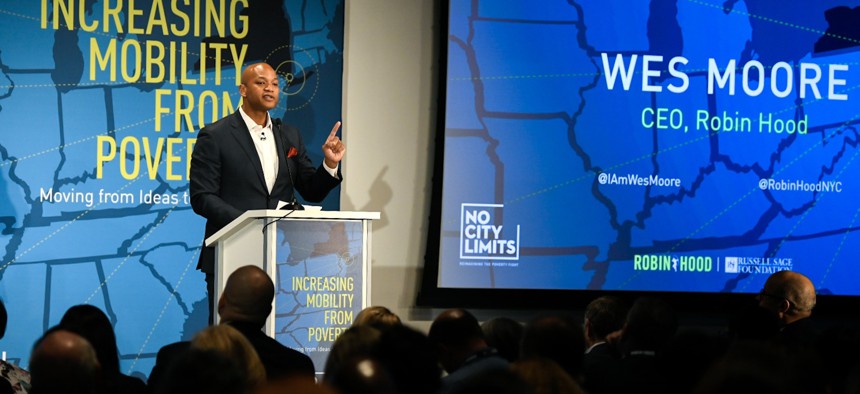The Robin Hood Foundation has a new anti-poverty initiative

Robin Hood Foundation CEO Wes Moore at a Feb. 4, 2019 event in New York City Robin Hood Foundation
An anonymous donor is behind an effort to help low-income people feed their pets. More than 254 pantries across New York City provide free dog and cat food through a collaboration between the American Society for the Prevention of Cruelty to Animals and the Food Bank for New York City. It all began last year after an unnamed donor provided the money to get the $300,000 idea off the ground. Since then, more than 400,000 pet meals have been distributed, amNewYork reports.
Nominations are open for the Notable Women in Human Services Hall of Fame. The virtual distinction recognizes women past and present who have impacted the human services sector in New York and the people they serve. Honorees will be announced on March 5, with nominations closing on Feb. 8.
I just nominated someone. What are you waiting for? https://t.co/Y2hJpBk63h
— Maria Lizardo (@marializardo) February 4, 2019
Teens caught up in the juvenile justice system are getting ready to show off their original musical compositions. A collaboration between Carnegie Hall and the New York City Administration for Children’s Services is behind the upcoming Feb. 8 performance, where teens from Passages Academy and the Bronx Hope School will perform at Carnegie Hall’s Future Music Project. Carnegie Hall artists, including Orson Benjamin, Okai, Aynsley Powell, Frankie Leroux, and Bridget Barkan, have helped the teens prepare their compositions. The teens are all involved in the Close to Home program, which allows teen offenders to serve their time in facilities near their families and communities.
“We come in every week with a fresh attitude to write songs, whether we’re working on something we originally started before or we want to work on a new composition or a new idea,” Parris Lewis, a teacher at Bronx Hope, told amNewYork. “It’s always just an adventure because you never know what they’re going to bring to the table or what their response is going to be. … With these students, this is a time in their day where they’re able to flesh out whatever they might be feeling.”
The Robin Hood Foundation has announced a new $25 million anti-poverty initiative. About 250 people took part in the Feb. 4 conference, “No City Limits Reimagining the Poverty Fight 2019.” Many prominent leaders in the nonprofit sector in New York were speakers and panelists, including: Sheldon Danziger, president of the Russell Sage Foundation; Geoffrey Canada, president of Harlem Children’s Zone; Raj Chetty; John King, president and CEO of The Education Trust; and Katherine O’Regan, professor of public policy and planning at the NYU Wagner Graduate School of Public Service, according to a Feb. 4 press release.
See what you missed @RobinHoodNYC conference today!⚡️ “No City Limits Reimagining the Poverty Fight 2019”https://t.co/4AsSwCyo1A
— NYN Media (@NYN_media) February 4, 2019
At the event, Wes Moore, CEO of the foundation, announced that the new $25 million Mobility Learning and Action Bets initiative will aim to catalyze new ideas championed by “dynamic leaders” who want change national conversations around social and economic mobility. It will do that through partnerships with donors such as The Harry and Jeanette Weinberg Foundation, and Tipping Point Community, with additional support from the Bill & Melinda Gates Foundation.
Moore also announced that new data available on the foundation’s eponymous Poverty Tracker showed that 42 percent of New Yorkers experience poverty at some time in the past three years. That is twice the official poverty rate citywide, according to the press release. Here are a few other takeaways from the new data, taken verbatim from the press release:
- New Yorkers by and large perceive the economy as unfair and opportunity to be limited, including children’s chances of outperforming their parents.
- New Yorkers overwhelmingly believe that, in the United States, not everyone has an equal chance, and a majority think that the economic system is unfair.
- 71 percent of New Yorkers report that in this country we do not give everyone an equal chance.
- When asked what drives chances of achieving success, New Yorkers cited having a good education, hard work, and knowing the right people.
- Despite this relatively gloomy outlook on the state of affairs in the country, most New Yorkers remain optimistic about their own chances of seeing their situation improve.